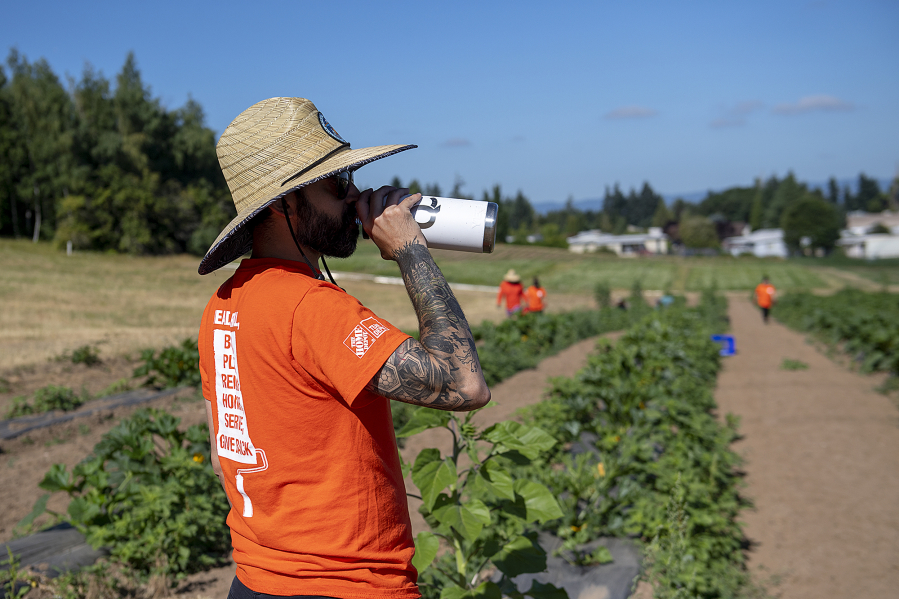Nancy Funk shades her eyes from the morning sun as she directs volunteers to dig up weeds lining the Clark County Food Bank’s squash plants at 78th Street Heritage Farm in Hazel Dell.
She knows the produce she’s nurtured from seedlings will be in the hands of someone who needs it soon. It’s why she’s spending her retirement years dressed in overalls as a regular volunteer for the food bank’s farming and gleaning program.
“With the food bank, it’s really just a good use of the property, and it goes to the community,” she said. “That’s why it’s so important to keep this property as agriculture — for the good of the whole.”
The program has been a source of fresh food for local residents for 14 years. The food bank farms zucchinis, green beans, squash, carrots and other crops on 10 acres at 78th Street Heritage Farm. The plot produced 90,000 pounds of the more than 228,000 pounds of food the farming and gleaning program collected last year.
Vendors at the Vancouver Farmers Market donate leftover produce, and farmers sometimes invite the food bank’s volunteers to harvest their unmarketable or extra produce.
The food bank also buys from 16 local farms, paying half of the contract up front to cover start-up costs for the planting, said Emily Straw, the food bank’s director of technical program support.
“We do love to support our local small farms,” she said. “It’s hard to be a farmer in Clark County, so we want to make sure that they have support whenever possible.”
In 2017, the last time the U.S. Department of Agriculture collected county-level data on farms, many farmers in Clark County spent more on production than they received in profit, resulting in an average net income loss of almost $5,000.
Food banks often receive donations of canned food, which is easier to manage because it has a longer shelf life, but having fresh produce is worth the extra work, Straw said.
“We love produce. Food for our clients is important for a lot of reasons,” Straw said. “It’s important culturally. It’s important that you can celebrate your kiddo’s birthday. It’s important that you know how to cook it. It’s important that it sustains your life.”
The national nonprofit Feeding America estimates 8.4 percent of Clark County residents were food insecure in 2021. That’s more than 42,000 people.
The food bank’s program provides cost-burdened families a pathway to free produce without spending money at grocery stores, where food costs rose by 11.4 percent last year, according to the Department of Agriculture.
Food bank volunteer John Presson, taking a break from harvesting zucchinis, said food from the farm is fresher than at the grocery store.
“It’s already traveled one or two days, sat in a cooler or store — four or five days old,” Presson said about grocery store produce. “What we give them is hours old.”
The farm also serves an educational purpose by showing people the behind-the-scenes process of food production. Food in grocery stores can be deceiving because stores often stock shelves with the best-looking produce, volunteers said.
The squash in the crates they carry are different sizes, shapes and colors.
“I just like seeing people experience pulling a carrot out of the dirt for the first time and being like, ‘Whoa, this is a crazy-looking carrot. I can eat this?’” said Lily Gehrenbeck, an Americorps volunteer at the food bank’s farming program.
Volunteers in groups of six or fewer can stop by 78th Street Heritage Farm, at Northeast 78th Street and Northeast 19th Court in Hazel Dell, from 9 a.m. to noon Wednesdays and Saturdays from June through October. The farm also hosts companies’ team-building events and school tours with prior arrangement.
“It’s good to get your hands in the dirt,” Gehrenbeck said. “I think it’s really fun that you can do that while also helping out your community and being active within it.”
A few weeks ago, Funk had a moment with a volunteer that has stuck with her.
After they finished harvesting and plucking weeds, a young woman said the experience had brought her life full circle. She said she grew up experiencing homelessness in Clark County, relying on the food bank to survive, and that working at the farm was fulfilling, Funk recalled.
“It really brings it to light,” Funk said. “Instead of ‘How many crates? How many pounds?’ People. It’s for people.”




